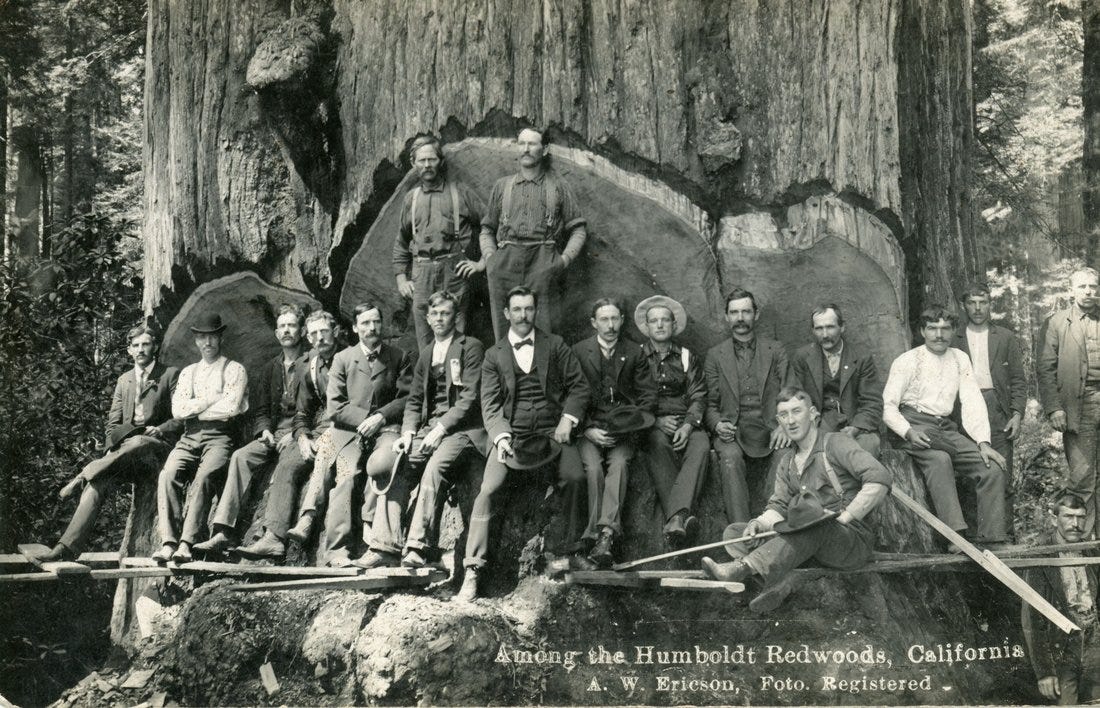Insult Your Friends Like a 19th Century Redwood Lumberjack!
If you don't read this post, consider yourself an "idle zoogler."
I’ve recently become entranced by the dangerous, tragic, and sometimes attractive world of Old-Growth Redwood logging in the late nineteenth and early twentieth century. The dangerous and tragic elements are self-evident in the loss of life and limb—both that of people and trees. But the attraction, for me, comes from the oddly utopian and pastoral aims of a few lumber factory towns, many of which were abandoned as ghost towns after the downturn of the depression, mechanization of logging, and federal protection of Redwood forests in the mid-twentieth century. Of course, this did not stop 95% of Old Growth from being felled so that the state of California could be built with slightly more rot-resistant wood. But these frozen-in-time snapshots of communities like Falk, CA (that flourished for nearly fifty years) are nevertheless compelling to me.
I’ve recently come across some remarkable terminology in my reading (most of the following comes from Falk’s Claim: The Life and Death of a Redwood Lumber Town) that relates to the felling of giant old growth redwoods, and I wanted to share it with you in a way that you could actually use: archaic insults directed toward your friends.
Feller: any workers involved specifically with bringing the giant trees down by hand (also known as a Chopper).
“We’ve no need for a union! Most of my men out there are just a collection of thick-headed fellers who wouldn’t know collective action if it fell atop them!”
Ringer: The axe man who chops the branches from the fallen tree to prepare it for sectioning.
“Damn you, sir, you’ve trimmed my hair too close! What are you, some kind of ringer?!”
Peeler: The axe man who peels the foot-thick bark from the fallen tree.
“Maddie! I’ve got a hundred lumberjacks in this dining hall to feed and these lettuce heads have been pruned til Kingdom Come! Why don’t you join the peelers outside…I’m tired of spending eight cents an hour on ‘ye!”
Bucker: The axe man who sections the falling tree.
“After that bandsaw accident the doctor took my leg off like a common bucker!”
Swamper: The man who clears the brush for a Redwood log to slide down a hill towards the transport locomotives.
“What? No moonshine left in the entire jug? You’re greedier for whisky than a swamper for sticks!”
Waterslinger: The man who wet the path under the sliding log.
“He’ll pass himself off as a great Casanova, but I’ve heard he’s actually clumsier than a waterslinger at midnight.
Zoogler: The man who maintained contact and tension between logs traveling downhill.
“Look at you, like a petty zoogler, trying to keep it together while telling me I now have to provide workmen’s compensation in agreement with the Boynton Act of 1913. Just say it, boyo, and get the hell out of my office! I’ve got trees to cut!”
Steam Donkey: A steam-powered engine that pulled the giant logs from place-to-place.
“Ever since the dam broke, lumber baron life is meaningless to me. I barely get any satisfaction from firing loggers or suppressing news of sawmill worker deaths, which number one per 150 men. I just go to-and-fro, to-and-fro, like a bloody steam donkey.”





Yup